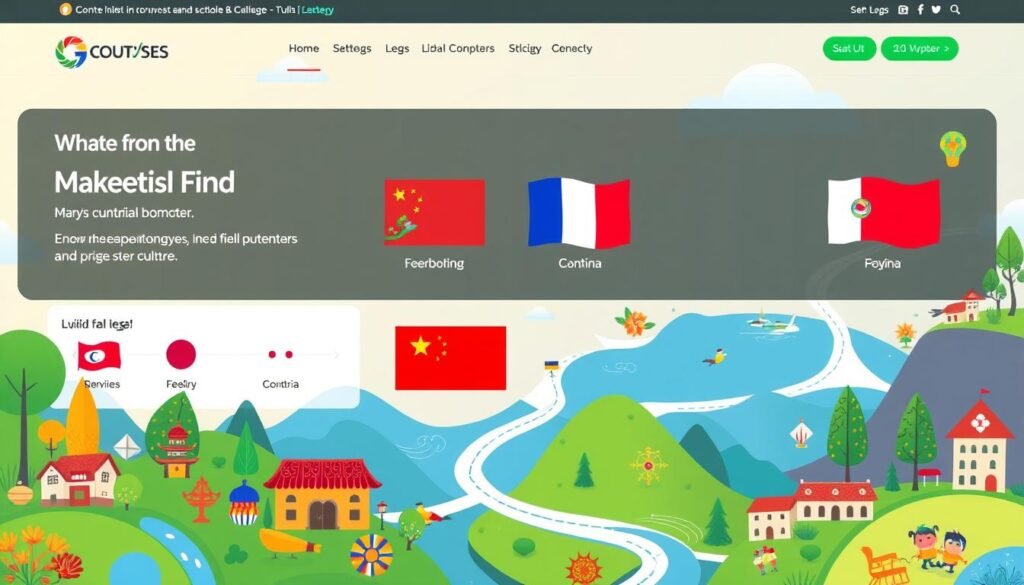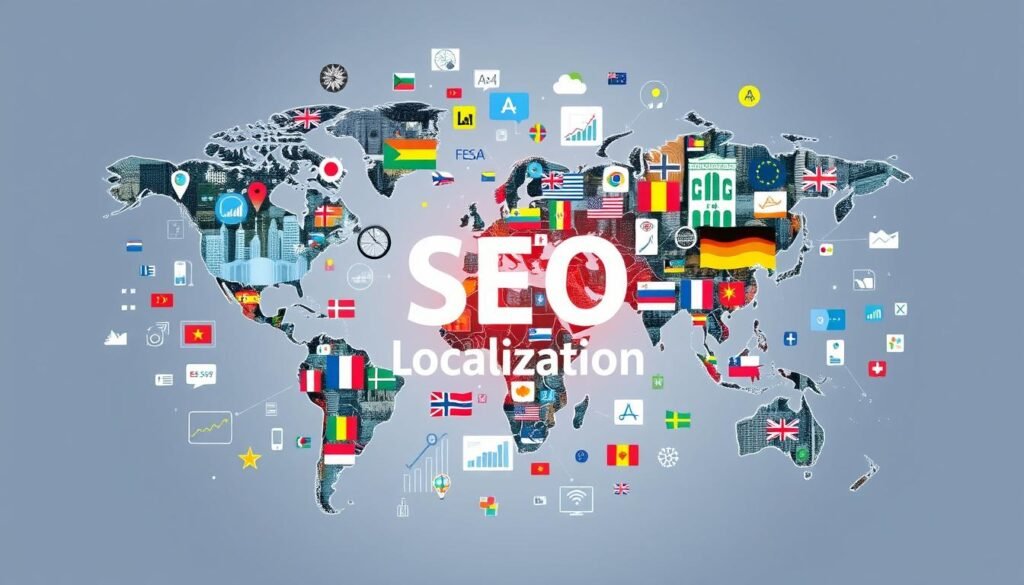About 51% of marketers think SEO is key for a company’s success1. SEO localization makes a big difference for businesses wanting to grow. It’s about making your website better for search engines in certain areas or languages.
By changing content, metadata, and technical stuff to fit local search habits, your site can get more views. This helps attract new customers from all over the world.
Key Takeaways
- SEO localization involves optimizing various website elements to cater to different languages and regions2.
- Localizing websites can lead to a boost in visibility for new markets1.
- Implementing SEO localization processes can enhance content with key search terms used by specific regions1.
- Localized SEO strategies can lead to increased traffic by making content more discoverable and relevant2.
- Localizing SEO can help a business widen its reach and tap into new markets, expanding its audience globally3.
What is SEO Localization
SEO localization makes a website visible in specific areas or languages4. It changes content, metadata, and tech to fit local search habits4. This way, a site can reach more people by meeting their search needs.
Localized SEO boosts traffic by making sites visible in local languages4. Using local keywords is key to attract visitors from various places4. It also makes the site more user-friendly, which can lead to more sales4.
SEO for local areas can keep visitors on the site longer4. Making a site local builds trust and grows it internationally4. Better local search rankings can also help the site rank better globally4.
Researching Your Target Market
Knowing your target market and using geotargeting are vital for SEO localization4. Translating site elements like titles and URLs can improve international SEO4. It’s also important to understand local search engine preferences4.
“SEO translation aims to get websites to the top of search engine rankings by optimizing content for search engines, taking into account keywords, titles, tags, expressions, and script messages to enhance searchability5. Localization goes beyond translation by adapting content on a cultural level to engage the audience directly, ensuring that content resonates culturally and does not feel like a translated copy.”5
Good translations can make a site SEO-friendly in many languages4. To succeed in international markets, localizing SEO content is better than just translating it5.
In summary, SEO localization is key for businesses wanting to grow globally. By tailoring content and tech to local tastes, sites can attract more visitors, improve user experience, and gain credibility in new markets465.
Benefits of SEO Localization
SEO localization is a key strategy for growing your online presence. It helps you target local customers and bring in relevant traffic from specific areas7.
Localized websites offer a better user experience for local audiences. This leads to lower bounce rates, more engagement, and higher conversion rates. Studies show that 75% of consumers prefer to buy in their native language7. Also, 60% rarely or never buy from English-only sites7.
- A European Commission survey found that 9 out of 10 internet users choose their mother tongue when available7.
- In travel, 74% are more likely to book in their language7.
- 56.2% of consumers value product info in their language more than price7.
Proper local SEO and multilingual optimization boost your website’s visibility and user experience. By understanding your audience’s search behaviors, cultural preferences, and language, you can craft a localized SEO strategy that works8.
The advantages of SEO localization extend beyond more traffic. It’s about building long-term relationships with local customers, boosting your brand’s credibility, and setting your business up for international growth and success9.
Building Credibility and International Growth
Website localization is key for global SEO. It helps a brand grow in local markets and then expand globally. Region-specific SEO boosts local rankings and sets the stage for international success.
Using local keywords in SEO localization can greatly increase website traffic and sales10. A good localized SEO strategy also improves user experience for local visitors10.
As a website gains credibility in its local market, its Domain Authority (DA) increases. DA measures a site’s strength against competitors10. This strong base can open doors to new international markets, growing a brand’s global reach10.
International SEO needs specialized skills and deep experience. Localization must adapt content and cultural references to fit the target market11. Working with experts in translation and SEO is vital for global growth11.
In today’s digital world, a mobile-first approach is essential for global SEO. Over 66% of internet traffic comes from mobile devices12. Using localization tactics like keyword adaptation and multilingual content can attract more visitors and boost sales globally12.
By using SEO localization, businesses can increase credibility, improve their online image, and find new chances for growth and expansion111012.
Researching Your Target Market
Before you start translating and optimizing content for a new market, it’s key to learn about local search habits and preferences13. Working with SEO experts can reveal the most used search terms, local slang, and terms that might be unknown to you13. This makes sure your keywords and content match how people in that area search and use the internet.
Knowing what search engines are popular in your target area is also important for SEO localization13. While Google is big in many places, other engines like Baidu, Yandex, or Naver might be more used in certain countries or areas14. It’s important to optimize for the search engine that’s most used in your target market for good localization15.
Doing deep market research also means understanding how local customs, beliefs, and social norms affect how people shop14. Making your online presence fit with local tastes can make your brand seem more relevant, credible, and trustworthy to local shoppers14.
Another key part of SEO localization is finding the right keywords for your target audience14. By finding out what search terms and phrases they use, you can make your content and metadata match their search habits better14. This can help you get more seen in local searches and give users a better experience13.
| Key Considerations for Researching Your Target Market |
|---|
|

By really getting to know your target market, businesses can make sure their content and SEO plans fit with what their audience likes and needs15. This can lead to better visibility in searches, more engagement, and ultimately, better business outcomes13.
Using Geotargeting Techniques
Geotargeting techniques like country-specific URLs and hreflang tags are key in SEO. They help search engines show the right content to users based on where they are16. This makes sure the right pages are shown to the right people, avoiding penalties for duplicate content.
Using geotargeting best practices is vital for geo-targeting seo and region-specific seo16. For example, using a country code top-level domain (ccTLD) helps with geo-targeting16. Also, getting TLD links can boost ranking for location-based searches16. Structured data and backlinks can also improve a business’s local SEO ranking16.
Businesses can also use email and social media to increase local brand awareness16. Google Business Profile can make a business more visible on Google Maps16.
Geotargeting Tools and Strategies
Geotargeting uses location data from mobile devices and computer IP addresses to show ads17. It’s more focused on culture and context than geofencing, which is action-oriented17.
Using geotargeting can make ads more personal and increase brand awareness17. Tools like Google Ads and Facebook Ads help target campaigns better17.
Geo-targeted ads often have higher conversion rates because they offer local deals18. Businesses see better engagement and online visibility with geo-targeting18. It also helps save money by focusing on areas more likely to respond18.
In summary, geo-targeting seo and region-specific seo are key for better website visibility in specific areas. By using these strategies, businesses can improve local visibility, user experience, and drive more traffic and conversions.
Translating All Important Site Elements
When making a website local, it’s key to translate all important parts. This includes title tags, meta descriptions, image alt tags, and URLs. This makes sure the content works well with search engines and gives a smooth experience for users in the target area19. Translators need to be careful with word limits and creative to keep the text interesting while keeping metadata compelling.
SEO translation aims to get websites to the top of search results by making content easy to find in different languages20. It needs both translation and SEO skills to make sure the content does well on search engines20. Keywords are very important, but direct translations of them might not work as well in other languages20.
Localization is more than just translation. It makes content fit the culture and interests of the audience20. Cultural differences can make direct translations not work well, like with slogans or idioms20. Using both SEO translation and localization can make websites easier to find and more appealing to different people20.
| Factors to Consider | SEO Translation | Localization |
|---|---|---|
| Focus | Optimizing content for searchability in different languages | Adapting content to make it culturally relevant and engaging |
| Expertise Required | Translation and SEO tactics | Cultural understanding and adaptation |
| Key Considerations | Keyword effectiveness, character limitations | Slogans, idioms, wordplay, user preferences |
Some parts, like terms of use, might just need to be translated. But main content should be localized20. Localization helps share company values, connect with customers, and promote products worldwide20.

Geotargeting makes websites more relevant in search results, as search engines favor local content21. But, different places have different search engine preferences. It’s key to do keyword research for each language and area for good multilingual SEO19.
To boost SEO for multilingual sites, create unique content, focus on URL structure, include language tags in URLs, and use hreflang annotations19. Quality translations are key for successful multilingual SEO. It’s better to use professional translators than automated tools to keep content accurate and engaging19.
“Localization goes beyond translation by adapting content to make it culturally relevant and engaging for the target audience.”
Understanding Local Search Engine Preferences
When you’re looking to grow globally, knowing the local search engine preferences is key. Google might be big in many places, but Baidu, Yandex, or Naver could be the top choice in certain areas22. It’s important to tailor your content for each region to reach your audience effectively.
Every search engine has its own way of working, and different countries have their own search habits22. For example, in China, Google isn’t as popular, so Baidu or Yandex are preferred22. Knowing this helps you make your content more effective for each area.
By getting to know the local search engine preferences, you can make your global SEO better22. This makes your site more visible to people all over the world22. It also makes your site more appealing to local users, which can lead to more engagement and sales22.
Adjusting your SEO to fit local search engine preferences is vital for region-specific SEO22. By understanding what people search for in different places, you can fine-tune your content and tech to get more visibility globally22. This approach to SEO localization can open up new doors for international growth and success.
what is seo localization
In today’s world, businesses reach far and wide. SEO localization is key to success. It means making your website search-friendly in certain areas or languages23. You adjust content and tech to match local search habits, so your brand is seen by the right people.
Local SEO, multilingual SEO, and international SEO are vital. Most global customers prefer searching in their own language23. Making your site available in their language can boost traffic by 45%23. Good geo-targeting SEO helps you connect with your audience, leading to growth and more sales.
At the core of global SEO and region-specific SEO is knowing that search habits vary by region. Google is big in many places, but Baidu, Yandex, or Naver might be more used elsewhere21. Tailoring your SEO to fit these local search engine likes is essential for success abroad.
Using SEO localization wisely can make your business more credible and appealing to local users2. It’s about optimizing keywords, translating site elements, and understanding what your audience in each area wants. This approach is key to growing your business in new markets.

“Effective SEO localization can improve search visibility, attract more users, increase conversions, and drive sales.”2
Linking to Local Content
When you enter new international markets, it’s key to swap out old links for new ones. These should be specific to the region or country you’re targeting24. This makes it clear to search engines what your content is about and boosts your site’s credibility24.
Building a network of local links is vital for SEO success24. Working with local partners and influencers can help. It shows search engines your site is an authority in the area24. Plus, it makes your site more useful to visitors by giving them local info25.
Using local links also makes your brand more trustworthy. This can lead to more loyal customers25. Making your product or service pages more local can draw in more people from your target area25.
| Local SEO Tactics | Benefits |
|---|---|
| Replacing generic links with local links | Improved search engine relevance and local credibility |
| Building a network of local backlinks | Boosted website authority and visibility in target market |
| Linking to local content and resources | Enhanced user experience and brand reputation |
| Optimizing local product/service pages | Increased targeted traffic and conversions |
By focusing on local content and building links, businesses can grow their presence in new markets2425.
Conclusion
SEO localization is key for global success. It makes websites and content fit for different places and languages. This boosts our visibility and attracts more visitors, giving a better experience to local users26.
To do SEO localization right, we need to know what people in our target markets like. We use geotargeting, translate key site parts, and learn what local search engines prefer27. This effort helps us grow internationally and makes our brand global26.
Customizing our content and SEO strategies for each market can really help. It increases our visibility and sales, and makes our site better for local users26. Working with experts like Kings of Translation and SDL can make our SEO localization even stronger27.
It’s important to keep checking and tweaking our SEO localization plans. This way, we can always get better and see better results2627.
FAQ
What is SEO localization?
What are the benefits of SEO localization?
How does SEO localization help build credibility and drive international growth?
Why is it important to research the target market before localizing content?
What are some geotargeting techniques used in SEO localization?
How important is it to translate all critical site elements for SEO localization?
How do local search engine preferences impact SEO localization?
Why is it important to replace hyperlinks with region-specific links when localizing content?
Source Links
- SEO and Localization: A Few Best Practices | Smartling – https://www.smartling.com/resources/101/seo-and-localization-a-few-best-practices/
- SEO Localization: Tactics for Targeted Global Online Visibility – https://www.semrush.com/blog/seo-localization/
- The Importance Of SEO In Localization – Localize Articles – https://localizejs.com/articles/importance-seo-localization?srsltid=AfmBOopNmcF-cmlAxbAm9FE1Pjo35ByxMElrMaI1FTey98nJRZSq1q7l
- The Importance Of SEO In Localization – Localize Articles – https://localizejs.com/articles/importance-seo-localization?srsltid=AfmBOorOBPAB4XiDbB_KJvrCdRgIMWYxzetiG6eukReQk_NSOtoB-Szv
- SEO Translation vs. Localization | Argo Translation – https://www.argotrans.com/blog/seo-translation-vs-localization
- SEO Localization: Steps, Tips & Examples – https://seranking.com/blog/seo-localization/
- SEO localization – https://community.hubspot.com/t5/Content-Strategy-SEO/SEO-localization/m-p/687414
- Why SEO Localization Matters & How It Can Benefit Your Business? — Serpstat Blog – https://serpstat.com/blog/why-seo-localization-matters-how-it-can-benefit/
- Why SEO localization is more effective than translations | Wix SEO Hub | Wix SEO Hub – https://www.wix.com/seo/learn/resource/seo-localization-vs-seo-website-translations
- The Importance Of SEO In Localization – Localize Articles – https://localizejs.com/articles/importance-seo-localization?srsltid=AfmBOooGhDfAaKg2nacvZfQOBsF_VbrOOJkK1Bbq9pzmvS0f05pVZMEJ
- A Quick Introduction to SEO Localization – https://www.atltranslate.com/blog/seo-localization
- Localization Strategies for Global SEO Success in Manufacturing – https://catsy.com/blog/localization-strategies-for-global-seo/
- What is SEO Localization? – Complete Guide for Marketers – https://www.getblend.com/blog/what-is-seo-localization/
- SEO Localization Guide: Everything You Need to Know | EC Innovations – https://www.ecinnovations.com/blog/seo-localization-guide-everything-you-need-to-know/
- Mastering Global Search: A Guide to SEO Localization | Jonckers – https://www.jonckers.com/mastering-global-search-a-guide-to-seo-localization
- SEO Geo-Targeting to Increase Your Ranking Within a Specific Area – Tamoco – https://www.tamoco.com/blog/seo-geo-targeting-to-increase-your-ranking-within-a-specific-area/
- How to deliver location-based content with geotargeting | Webflow Blog – https://webflow.com/blog/geotargeting
- Understanding the Importance of Geotargeting in Local SEO – inSights – https://insights.upgrowth.in/why-is-geotargeting-essential-for-local-seo-success/
- 10 best practices to improve your multilingual website SEO – https://veracontent.com/mix/localization-seo-multilingual-websites/
- SEO Translation vs. Locale-based: Which Is Best for Your Website? – Localize Articles – https://localizejs.com/articles/seo-translation-vs-localization-which-is-best-for-your-website?srsltid=AfmBOorI6hwtxDJzEV_iYdwWNW_ju14na-lHPlXv2bj5EPdU9LFNpatR
- SEO localization strategy: Increasing organic search visibility worldwide – Acclaro – https://www.acclaro.com/blog/seo-localization-strategy-increasing-organic-search-visibility-worldwide/
- The Importance Of SEO In Localization – Localize Articles – https://localizejs.com/articles/importance-seo-localization?srsltid=AfmBOorGtt7axAWAoySO1ydxehSpIuOn2OBW8hldriE7rP8rz1_ajkHl
- The Importance Of SEO In Localization – Localize Articles – https://localizejs.com/articles/importance-seo-localization?srsltid=AfmBOoq6MZpbxT2G0ObebuMj4OZTTfk4WSxF_bB-2st07qV2Rrw2-pCl
- SEO Localization – what is it and why should you use it? – PUBLITRAD – https://publitrad.ro/seo-localization-what-is-it-and-why-should-you-use-it/
- How to Create Local Content for SEO Purposes | Markitors – https://markitors.com/local-content-for-seo-purposes/
- What is SEO Localization? Unlock the Power of Localized SEO – https://seotwix.com/blog/what-is-seo-localization/
- What is SEO Localization? – https://www.portotheme.com/what-is-seo-localization/
